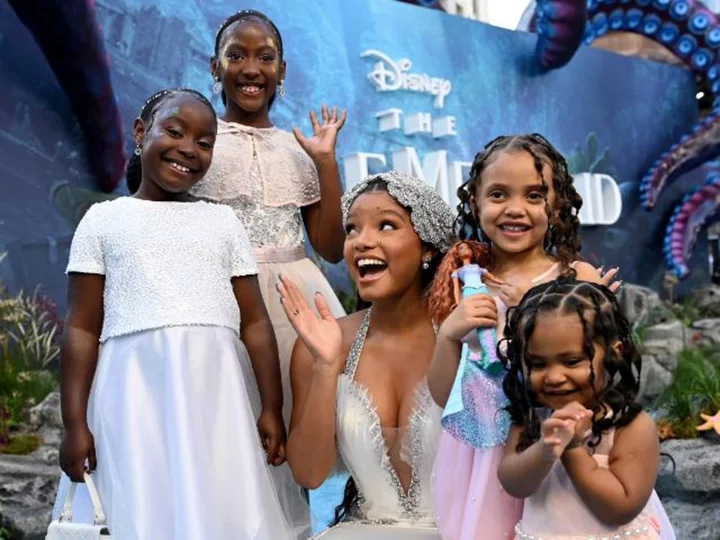Eleven-year-old Leah Murphy feels empowered by Halle Bailey's star role as Ariel in the live-action remake of "The Little Mermaid."
Murphy, of Farmington Hills, Michigan, who aspires to own a hotel chain, says it proves that she too can break barriers in spaces that have historically excluded young Black women like herself.
"It makes me feel inspired," she said. "It makes me think I can do this, I can do it without anyone stopping me."
In the original 1989 Disney animated classic, Ariel's character is White, with straight red hair. But as Murphy and other young Black and brown girls head to theaters this weekend to see "The Little Mermaid," they'll find an Ariel that is very much a reflection of themselves.
Animated movies are often a child's first exposure to media and film. And the representation of people of color in media influences how they feel about race as they mature, a study by the non-profit Common Sense has found. Parents who took part in the study said they wanted their kids to see themselves reflected in the media.
During the film's world premiere in Hollywood earlier this month, 23-year-old Bailey had a message for the little girls beaming in admiration.
"I just hope that they know they are worthy and we deserve to be in these spaces," Bailey said, according to Vanity Fair. "I hope that they see themselves through me on the screen. I'm just grateful to be here."
Racist backlash
The trailer for the film made waves earlier this year, setting off a series of debates about whether a real-life Ariel should be Black or White.
Out of the 12 Disney princesses, seven are White. It wasn't until 2009 that Disney introduced a Black princess in an original animated film with Tiana in "The Princess and the Frog." Singer and actress Brandy played Cinderella in a 1997 remake of the film. Disney's other racially diverse princesses were Mulan, Pocahontas and Jasmine.
Some critics argued on Twitter that Ariel was a White character from Danish European folklore and should remain that way. Others, including far-right pundit Matt Walsh, suggested that it didn't make scientific sense to have someone with darker skin living deep in the sea.
But what these critics failed to mention is that Ariel is a fictional character from a fairy tale story. So why does her race really matter?
As the country becomes increasingly diverse, it seems only fair for Disney to be more inclusive of Black princesses, whether animated or live.
The film's director, Rob Marshall, called it "small-minded" of critics to complain about casting a Black actress as Ariel, Vanity Fair reported.
"Being different, it's very timely, especially when you see how divided the world has become," Marshall said, according to Vanity Fair. "My hope is that this beautiful tale of a mermaid can remind us all that we are all one."
Despite the racist backlash, the excitement in Black households speaks to the historic significance of this moment.
Alexandra Francois, a 14-year-old from Baldwin, New York, said she planned to go see the movie this weekend with her mother.
"I just felt really honored in a way because you don't see people that look like you on the big screen all the time, especially as a Black girl," said Francois, a ballet dancer. "It gave me motivation for myself."
'It's a step forward'
Experts say Bailey's role is a sign of progress for Disney in its tradition of creating princesses.
Maryann Erigha, an associate professor of sociology and African American studies at the University of Georgia, said we live in a visual culture so the images young people see in movies matter. Ariel as a young Black woman with a natural hairstyle is something Black girls can rally around, Erigha said.
"I do believe it's a step forward," Erigha said. "Casting a young Black girl in a very prominent role in a major motion picture that's going to be seen worldwide ... I think that's very much a step in the right direction."
Disney's decision to cast Bailey as Ariel has gained praise from empowerment groups for young Black and brown girls.
Takiyah Wallace, founder and executive director of Brown Girls Do Ballet, said the excitement around the film reminds her of the reason she created her youth ballet group in 2013. Many young Black and brown girls had never seen themselves as ballerinas just like many have rarely seen themselves as Disney princesses, she said.
Wallace said "The Little Mermaid" remake also comes at a pivotal time when diversity and inclusion are under attack in some states where African American studies classes, programs and books are being banned.
"That representation is being snatched away," Wallace said. "So the film gives our girls that boost to go out and take on roles that maybe weren't written as a Black dancer, this age, this shape, this size, this kind of hair."
Shaela Lawson, executive director of Pretty Brown Girl -- a group that strives to empower Black and brown girls and encourage self-acceptance -- said she too hopes the movie will inspire young Black girls to break the stereotypes in the spaces they want to be in. Lawson said many young girls will feel an emotional connection to Bailey because they also want to be trailblazers.
"I think it's about time that we normalize inclusion," Lawson said. "Celebrating difference should be a part of every storyline whether it's a cartoon, an animated film or a TV series. You can't have this singular idea of who people can connect to."

